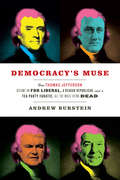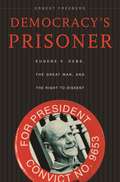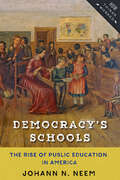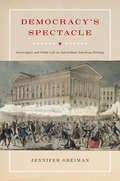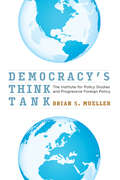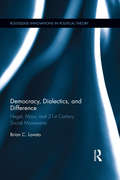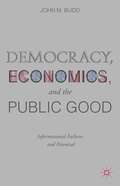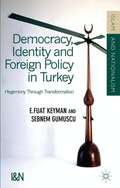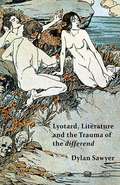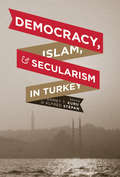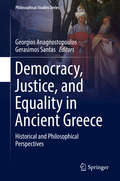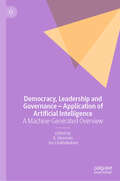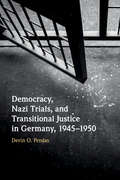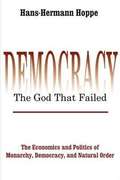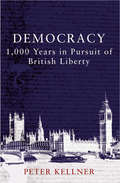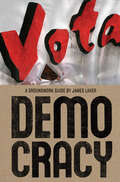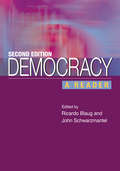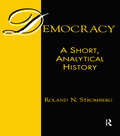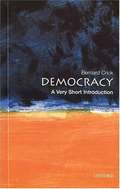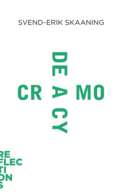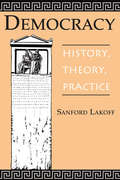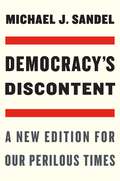- Table View
- List View
Democracy's Manifesto
by William O. DouglasAuthored by the longest serving US Supreme Court Justice in current history, this brief essay addresses political issues that were relevent during the early 1960's. Douglas is highly weary of communism and argues that a Free Society can be achievable for all nations.
Democracy's Muse: How Thomas Jefferson Became an FDR Liberal, a Reagan Republican, and a Tea Party Fanatic, All the While Being Dead
by Andrew BursteinIn political speech, Thomas Jefferson is the eternal flame. No other member of the founding generation has served the agendas of both Left and Right with greater vigor. When Franklin Roosevelt dedicated the iconic Jefferson Memorial on the founder's two hundredth birthday, in 1943, he declared the triumph of liberal humanism. Harry Truman claimed Jefferson as his favorite president, too. And yet Ronald Reagan was as great a Jefferson admirer as any Democrat. He had a go-to file of Jefferson's sayings and enshrined him as a small-government conservative. So, who owns Jefferson--the Left or the Right? The unknowable yet irresistible third president has had a tortuous afterlife, and he remains a fixture in today's culture wars. Pained by Jefferson's slaveholding, Democrats still regard him highly. Until recently he was widely considered by many African Americans to be an early abolitionist. Libertarians adore him for his inflexible individualism, and although he formulated the doctrine of separation of church and state, Christian activists have found intense religiosity between the lines in his pronouncements. The renowned Jefferson scholar Andrew Burstein lays out the case for both "Democrat" and "Republican" Jefferson as he interrogates history's greatest shape-shifter, the founder who has inspired perhaps the strongest popular emotions. In this timely and powerful book, Burstein shares telling insights, as well as some inconvenient truths, about politicized Americans and their misappropriations of the past, including the concoction of a "Jeffersonian" stance on issues that Jefferson himself could never have imagined. Here is one book that is more about "us" than it is about Jefferson. It explains how the founding generation's most controversial partisan became essential to America's quest for moral security--how he became, in short, democracy's muse.
Democracy's Prisoner: Eugene V. Debs, the Great War, and the Right to Dissent
by Ernest FreebergIn 1920, socialist leader Eugene V. Debs ran for president while serving a ten-year jail term for speaking against America’s role in World War I. Though many called Debs a traitor, others praised him as a prisoner of conscience, a martyr to the cause of free speech. Nearly a million Americans agreed, voting for a man whom the government had branded an enemy to his country. In a beautifully crafted narrative, Ernest Freeberg shows that the campaign to send Debs from an Atlanta jailhouse to the White House was part of a wider national debate over the right to free speech in wartime. Debs was one of thousands of Americans arrested for speaking his mind during the war, while government censors were silencing dozens of newspapers and magazines. When peace was restored, however, a nationwide protest was unleashed against the government’s repression, demanding amnesty for Debs and his fellow political prisoners. Led by a coalition of the country’s most important intellectuals, writers, and labor leaders, this protest not only liberated Debs, but also launched the American Civil Liberties Union and changed the course of free speech in wartime. The Debs case illuminates our own struggle to define the boundaries of permissible dissent as we continue to balance the right of free speech with the demands of national security. In this memorable story of democracy on trial, Freeberg excavates an extraordinary episode in the history of one of America’s most prized ideals.
Democracy's Schools: The Rise of Public Education in America (How Things Worked)
by Johann N. NeemThe unknown history of American public education.At a time when Americans are debating the future of public education, Johann N. Neem tells the inspiring story of how and why Americans built a robust public school system in the decades between the Revolution and the Civil War. It’s a story in which ordinary people in towns across the country worked together to form districts and build schoolhouses and reformers sought to expand tax support and give every child a liberal education. By the time of the Civil War, most northern states had made common schools free, and many southern states were heading in the same direction. Americans made schooling a public good.Yet back then, like today, Americans disagreed over the kind of education needed, who should pay for it, and how schools should be governed. Neem explores the history and meaning of these disagreements. As Americans debated, teachers and students went about the daily work of teaching and learning. Neem takes us into the classrooms of yore so that we may experience public schools from the perspective of the people whose daily lives were most affected by them.Ultimately, Neem concludes, public schools encouraged a diverse people to see themselves as one nation. By studying the origins of America’s public schools, Neem urges us to focus on the defining features of democratic education: promoting equality, nurturing human beings, preparing citizens, and fostering civic solidarity.
Democracy's Spectacle: Sovereignty and Public Life in Antebellum American Writing
by Jennifer Greiman"What is the hangman but a servant of law? And what is that law but an expression of public opinion? And if public opinion be brutal and thou a component part thereof, art thou not the hangman's accomplice?" Writing in 1842, Lydia Maria Child articulates a crisis in the relationship of democracy to sovereign power that continues to occupy political theory today. Is sovereignty, with its reliance on singular and exceptional power, fundamentally inimical to democracy? Or might a more fully realized democracy distribute, share, and popularize sovereignty, thus blunting its exceptional character and its basic violence? In Democracy's Spectacle, Jennifer Greiman looks to an earlier moment in the history of American democracy's vexed interpretation of sovereignty to argue that such questions about the popularization of sovereign power shaped debates about political belonging and public life in the antebellum United States. In an emergent democracy that was also an expansionist slave society, Greiman argues, the problems that sovereignty posed were less concerned with a singular and exceptional power lodged in the state than with a power over life and death that involved all Americans intimately.Drawing on Alexis de Tocqueville's analysis of the sovereignty of the people in Democracy in America, along with work by Gustave de Beaumont, Lydia Maria Child, Nathaniel Hawthorne, and Herman Melville, Greiman tracks the crises of sovereign power as it migrates out of the state to become a constitutive feature of the public sphere. Greiman brings together literature and political theory, as well as materials on antebellum performance culture, antislavery activism, and penitentiary reform, to argue that the antebellum public sphere, transformed by its empowerment, emerges as a spectacle with investments in both punishment and entertainment.
Democracy's Think Tank: The Institute for Policy Studies and Progressive Foreign Policy
by Brian S. MuellerIn Democracy's Think Tank, Brian S. Mueller places the Institute for Policy Studies (IPS) at the center of a network of activists involved in making the world safe for diversity. Unlike defense intellectuals at the RAND Corporation and other think tanks responsible for formulating military strategy, the "peace intellectuals" at IPS developed blueprints for an alternative to the U.S.-led world order.As the Iron Curtain fell across Eastern Europe, a triumphalist Cold War narrative emerged proclaiming victory for freedom, democracy, and free enterprise over totalitarianism. Yet for the peace intellectuals at IPS, the occasion did not merit celebration. Since its doors opened in 1963, IPS refused to embrace American exceptionalism and waged a battle against the Cold War and its liberal anti-communist supporters. As IPS founders Marcus Raskin and Richard Barnet saw it, in the process of fighting communism and preserving the liberal capitalist order, Cold War liberals had forsaken democracy.Democracy's Think Tank tells the story of IPS's crusade to resurrect democracy at home and abroad. Borrowing from populist, progressive, and New Left traditions, IPS challenged elite expertise and sought to restore power to "the people." To this end, IPS, in the words of journalist I. F. Stone, served as the "institute for the rest of us." Mueller tells the story of IPS's involvement in a broad range of grassroots campaigns aimed at ending the Cold War and increasing participatory democracy in the United States and across the globe. Contemporary observers seeking an alternative to American empire in the twenty-first century will find Democracy's Think Tank offers several possible paths toward a more democratic order.
Democracy, Dialectics, and Difference: Hegel, Marx, and 21st Century Social Movements (Routledge Innovations in Political Theory)
by Brian C. LovatoIt has been nearly two centuries since Marx famously turned Hegel on his head in order to repurpose dialectics as a revolutionary way of thinking about the internal contradictions of our social relations. Despite critiques from post-structuralists, post-colonialists, and others, there has been a resurgence of dialectical thought among political theorists as of late. This resurgence has coincided with a rise in the mention of words like class warfare, socialism, and communism among the general public on the streets of Seattle in 1999, in Cairo’s Tahrir Square, in the actions of the Greek anarchists and the Spanish indignados, and in the rallying cry of "we are the 99%" of the Occupy Movement, and in academia. This book explores how it is that dialectical thought might respond to the critiques brought forth by those on the left who are critical of Marxism’s universalizing and authoritarian legacy. Brian C. Lovato singles out Ernesto Laclau and Chantal Mouffe as the key interlocutors in this ongoing conversation between Marxism and post-structuralism. Laclau and Mouffe argue that Marxist theory is inherently authoritarian, cannot escape a class-reductionist theory of revolutionary subjectivity, and is bound by a closed Hegelian ontology. Lovato argues the opposite by turning to two heterodox Marxist thinkers, Raya Dunayevskaya and C. L. R. James, in order to construct a radically democratic, dynamic, and open conceptualization of dialectical thought. In doing so, he advances a vision of Marxist theory that might serve as a resource to scholars and activists committed not only to combatting capitalism, but also to fighting against colonialism, patriarchy, white supremacy, and heteronormativity. The writings of Dunayevskaya and James allow for Marxism to become relevant again in these tumultuous early years of the 21st century.
Democracy, Economics, and the Public Good
by John M. BuddExamining essential aspects of American life, John Budd investigates how informational sources (print and broadcast media and other resources) fall short when it comes to informing citizens, failing our democracy and damaging the public good.
Democracy, Identity, and Foreign Policy in Turkey
by E. Fuat Keyman Sebnem GumuscuThe recent history of Turkey is dominated by the country's transformation into a modern democracy. Over the past few years Turkey has been increasingly recognised as a nation of economic, political and cultural significance as well as being a vital political connection between Europe and the Middle East. In this compelling volume, Professor Keyman and Dr. Gumuscu put democratisation in Turkey under the microscope with an especial focus on recent transformations under the Justice and Development Party (AKP). Accordingly, it explores to what extent Turkey's transformation under the AKP has led to democratic consolidation as well as asking if there is a disconnect between economic, cultural, and urban transformation, on the one hand, and democratic consolidation on the other? Furthermore, this book also takes the opportunity to explore several issues that have a direct effect on the consolidation of Turkish democracy such as globalization, foreign policy activism, the kurdish question, religious governance and civil society. By critically analyzing the dialectic between domestic transformations and global/regional dynamics, the book also discusses the ways in which Turkish transformation is affected by the Arab uprisings as well as how Turkey may inspire these countries. "
Democracy, Identity, and Foreign Policy in Turkey
by E. Fuat Keyman Sebnem GumuscuThis original study examines Jean-Fran#65533;ois Lyotard's philosophical concept of the differend and details its unexplored implications for literature. it provides a new framework with which to understand the discourse itself, from its Homeric beginnings to postmodern works by authors such as Michael Ondaatje and Jonathan Safran Foer.
Democracy, Islam, and Secularism in Turkey
by Alfred Stepan Ahmet T. KuruWhile Turkey has grown as a world power, promoting the image of a progressive and stable nation, several policy choices have strained its relationship with the East and the West. Providing social, historical, and religious context for Turkey's singular behavior, the essays in Democracy, Islam, and Secularism in Turkey examine issues relevant to Turkish debates and global concerns, from the state's position on religion and diversity to its involvement in the European Union. Written by experts in a range of disciplines, the chapters explore the Ottoman toleration of diversity during its classical period; the erosion of ethno-religious diversity in modern, pre-democratic times; Kemalism and its role in modernization and nation building; the changing political strategies of the military; and the effect of possible EU membership on domestic reforms. They also conduct a cross-Continental comparison of "multiple secularisms" as well as political parties, considering the Justice and Development Party in Turkey in relation to Christian Democratic parties in Europe. The contributors tackle central research questions, such as what is the legacy of the Ottoman Empire's ethno-religious plurality and how can Turkey's assertive secularism be softened to allow greater space for religious actors. They address the military's "guardian" role in Turkey's secularism, the implications of recent constitutional amendments for democratization, and the consequences and benefits of Islamic activism's presence within a democratic system. No other collection confronts Turkey's contemporary evolution so vividly and thoroughly or offers such expert analysis of its crucial social and political systems.
Democracy, Islam, and Secularism in Turkey (Religion, Culture, and Public Life #11)
by Alfred Stepan Ahmet T. Kuru Eds.While Turkey has grown as a world power, promoting the image of a progressive and stable nation, several choices in policy have strained its relationship with the East and the West. Providing historical, social, and religious context for this behavior, the essays in Democracy, Islam, and Secularism in Turkey examine issues relevant to Turkish debates and global concerns, from the state's position on religion to its involvement with the European Union.Written by experts in a range of disciplines, the chapters explore the toleration of diversity during the Ottoman Empire's classical period; the erosion of ethno-religious heterogeneity in modern, pre-democratic times; Kemalism and its role in modernization and nation building; the changing political strategies of the military; and the effect of possible EU membership on domestic reforms. The essays also offer a cross-Continental comparison of "multiple secularisms," as well as political parties, considering especially Turkey's Justice and Development Party in relation to Europe's Christian Democratic parties. Contributors tackle critical research questions, such as the legacy of the Ottoman Empire's ethno-religious plurality and the way in which Turkey's assertive secularism can be softened to allow greater space for religious actors. They address the military's "guardian" role in Turkey's secularism, the implications of recent constitutional amendments for democratization, and the consequences and benefits of Islamic activism's presence within a democratic system. No other collection confronts Turkey's contemporary evolution so vividly and thoroughly or offers such expert analysis of its crucial social and political systems.Contributors: Karen Barkey (Columbia University) Ümit Cizre (Istanbul Sehir University) M. Sükrü Hanioglu (Princeton University) Stathis N. Kalyvas (Yale University) Ahmet T. Kuru (San Diego State University) Joost Lagendijk (Sabanc University) Ergun Özbudun (Bilkent University) Alfred Stepan (Columbia University)
Democracy, Justice, and Equality in Ancient Greece: Historical and Philosophical Perspectives (Philosophical Studies Series #132)
by Georgios Anagnostopoulos Gerasimos SantasThe original essays in this volume discuss ideas relating to democracy, political justice, equality and inequalities in the distribution of resources and public goods. These issues were as vigorously debated at the height of ancient Greek democracy as they are in many democratic societies today. Contributing authors address these issues and debates about them from both philosophical and historical perspectives. Readers will discover research on the role of Athenian democracy in moderating economic inequality and reducing poverty, on ancient debates about how to respond to inborn and social inequalities, and on Plato’s and Aristotle’s critiques of Greek participatory democracies. Early chapters examine Plato’s views on equality, justice, and the distribution of political and non-political goods, including his defense of the abolition of private property for the ruling classes and of the equality of women in his ideal constitution and polis. Other papers discuss views of Socrates or Aristotle that are particularly relevant to contemporary political and economic disputes about punishment, freedom, slavery, the status of women, and public education, to name a few. This thorough consideration of the ancient Greeks' work on democracy, justice, and equality will appeal to scholars and researchers of the history of philosophy, Greek history, classics, as well as those with an interest in political philosophy.
Democracy, Leadership and Governance – Application of Artificial Intelligence: A Machine-Generated Overview
by Jos Chathukulam K. GireesanIn today’s rapidly evolving political landscape, the intersection of democracy, leadership, and governance with artificial intelligence (AI) has become a focal point for academic inquiry and practical explorations. This book is a machine-generated literature overview that explores the opportunities, challenges, and impacts of integrating AI technologies in democratic processes, leadership dynamics, and sustainable governance. Through a collection of thought-provoking chapters, readers will gain insights into the transformative potential of AI that revisits the tenets of deliberative democracy, redefines leadership roles, and rejuvenates public service delivery. This volume offers a comprehensive exploration of the processes and practices of democratic decision-making, leadership development, and sustainable governance. It serves as a valuable resource to academics, policymakers, and practitioners navigating through the concepts, dimensions, and praxis of democracy, leadership, and governance. It is an important value addition to the body of knowledge and paves the way for informed decision-making and responsible application of digital technologies for good governance.
Democracy, Nazi Trials and Transitional Justice in Germany, 1945–1950
by Devin O. PendasPost-war Germany has been seen as a model of 'transitional justice' in action, where the prosecution of Nazis, most prominently in the Nuremberg Trials, helped promote a transition to democracy. However, this view forgets that Nazis were also prosecuted in what became East Germany, and the story in West Germany is more complicated than has been assumed. Revising received understanding of how transitional justice works, Devin O. Pendas examines Nazi trials between 1945 and 1950 to challenge assumptions about the political outcomes of prosecuting mass atrocities. In East Germany, where there were more trials and stricter sentences, and where they grasped a broad German complicity in Nazi crimes, the trials also helped to consolidate the emerging Stalinist dictatorship by legitimating a new police state. Meanwhile, opponents of Nazi prosecutions in West Germany embraced the language of fairness and due process, which helped de-radicalise the West German judiciary and promote democracy.
Democracy, the God that Failed: The Economics and Politics of Monarchy, Democracy and Natural Order
by Hans-Hermann HoppeHoppe calls for an alignment of conservatism and libertarianism and suggests, among other things, that the production of defense should be undertaken by insurance companies on the free market.
Democracy: 1,000 Years in Pursuit of British Liberty
by Peter KellnerDemocracy is Britain's gift to the world. Most of the ideas and ideals that have shaped the world's democracies can be traced back to arguments and reforms that first erupted here. Democracy tells the thousand-year story of the bitter battles over those arguments and reforms, in the words of those who shaped our democracy, fought for it and resisted it. It includes the major documents of the past millennium, such as the Magna Carta and the Bill of Rights, and the speeches of the big beasts of the democratic jungle, such as Thomas More, Cromwell, Wilberforce, Gladstone and Churchill, as well as the contributions made to the democracy struggle by rebels, poets, satirists and novelists, from Shakespeare and Burns to Dickens and Orwell.Also featured are many important documents that have been rescued from obscurity, such as a speech that a prominent twentieth century MP was barred from delivering: he wanted to argue why he should not be expelled from the House of Commons.Democracy covers not just the constitution and the law, but debates over free speech, slavery, empire, the death penalty and Europe, and includes key events in England's relations with Scotland, Wales and Ireland. This remarkable chronicle is guaranteed to inform, educate and inspire.
Democracy: A Groundwork Guide (Groundwork Guides)
by James LaxerAn investigation of the origins of democracy in a range of countries and societies, from ancient Greece to modern times, and the threats that democracy is under today. An excellent introduction to democracy for young adults. In this eye-opening work, political scientist and award-winning author James Laxer warns readers that our common assumptions about democracy — that it is a natural progression of advanced societies and that it is on the rise worldwide — are misguided. Democracy, in fact, is very fragile. Showcasing examples from all over the world, this book explains the rise of democracy in the twentieth century and examines the current status of democracy in advanced countries and in Asia, Africa, the Middle East, and Latin America. Laxer warns that globalization and the widening gap between the rich and poor threaten to weaken democracy and the vigor of democratic regimes — even in countries where it has been long established. "[The Groundwork Guides] are excellent books, mandatory for school libraries and the increasing body of young people prepared to take ownership of the situations and problems previous generations have left them." — Globe and Mail Correlates to the Common Core State Standards in English Language Arts: CCSS.ELA-LITERACY.RI.6.1 Cite textual evidence to support analysis of what the text says explicitly as well as inferences drawn from the text. CCSS.ELA-LITERACY.RI.6.2 Determine a central idea of a text and how it is conveyed through particular details; provide a summary of the text distinct from personal opinions or judgments. CCSS.ELA-LITERACY.RI.6.3 Analyze in detail how a key individual, event, or idea is introduced, illustrated, and elaborated in a text (e.g., through examples or anecdotes).
Democracy: A Reader
by Ricardo BlaugDemocracy is an essential collection of source texts by major historical figures on the value of democracy, key concepts and practices, theoretical perspectives, and contemporary challenges. The volume includes reflections on democracy by Machiavelli, Hobbes, Madison, Mill, Lincoln, and Paine. It features Rousseau and Kant on freedom and autonomy; Locke on equality; Burke and Bakunin on representation; Wollheim and Tocqueville on majority rule; and Crick on citizenship. Conservative, Marxist, socialist, and feminist critiques are followed by new sections on the market, civil society, participation, the Internet, nationalism, religion, multiculturalism, cosmopolitan democracy, and violence. Perfect for course use, the book provides an unparalleled introduction to standard articulations of democracy and its multiple manifestations in our interconnected, conflict-ridden world.
Democracy: A Short, Analytical History
by Roland N. StrombergThis text sums up the democratic experience in modern Western civilisation. It defines the term and notes the confusions in it, and its changing meanings over the past two centuries or so. It records criticisms, and is especially concerned with the conditions that are neccessary for it to exist. This encompasses a comprehensive literature which the author seeks to summarise and present to the reader in accessible form. It is appropriate material for course reading in Westen civilisation, intellectual history, political thought, and philosophy.
Democracy: A Very Short Introduction
by Bernard CrickNo political concept is more used, and misused, than that of democracy. Nearly every regime today claims to be democratic, but not all 'democracies' allow free politics, and free politics existed long before democratic franchises. This book is a short account of the history of the doctrine and practice of democracy, from ancient Greece and Rome through the American, French, and Russian revolutions, and of the usages and practices associated with it in the modern world. It argues that democracy is a necessary but not a sufficient condition for good government, and that ideas of the rule of law, and of human rights, should in some situations limit democratic claims.
Democracy: Conceptualization, Measurement, And Explanation (Reflections)
by Svend-Erik SkaaningA short but engaging look at democracy: what it is, how it compares to other forms of rule, and why it makes a difference.What is democracy? And even if it can be defined, can true democracy ever be achieved? Without a definition, dictators can pose as democrats and the oppressed can see despotism as the answer to their prayers. But true democracy, author Svend-Erik Skaaning argues, will not automatically solve the world's problems. It is contentious and unfair, even as it keeps tyrants at bay. In Democracy, Skaaning defines democracy, charts its rise, revival, and resurgence across history and nations, and discusses when democracy has made a difference—and when and why it has failed. ReflectionsIn Reflections, a series copublished with Denmark's Aarhus University Press, scholars deliver 60-page reflections on a key concept that encapsulates their years of study and research. These books present unique insights on a wide range of topics and concepts—everything from love, trust, and play to corruption, welfare, and sleep—that entertain and enlighten readers with exciting discoveries and new perspectives.
Democracy: History, Theory, Practice
by Sanford Lakoff<p>Written with remarkable erudition and clarity, this text is the most comprehensive introduction to democracy available in a single volume. Tocquevillian in its scope and historical-philosophical in its orientation, Democracy traces popular government from its classical origins through the authoritarian and totalitarian backlash of the twentieth century. <p>Unified by the theme of democracy as autonomy—communal, plural, and individual—the study examines democratic government and politics in normative, institutional, and procedural terms.Students of democracy will find this book especially valuable for its account of the democratic ideal as a concept in the history of political thought, ranging from Athenian direct democracy and Roman republicanism to liberal democracy. <p>Showing the interplay of theory and practice, Lakoff analyzes the character of modern democracy, or “compound autonomy,” as expressed in voting and electoral systems, federalism, and efforts of democratization around the world. His synthesis leads to the conclusion that although democracy is neither perfect nor inevitable, it is humanity's best hope.</p>
Democracy’s Discontent: A New Edition for Our Perilous Times
by Michael J. SandelA renowned political philosopher updates his classic book on the American political tradition to address the perils democracy confronts today.The 1990s were a heady time. The Cold War had ended, and America’s version of liberal capitalism seemed triumphant. And yet, amid the peace and prosperity, anxieties about the project of self-government could be glimpsed beneath the surface.So argued Michael Sandel, in his influential and widely debated book Democracy’s Discontent, published in 1996. The market faith was eroding the common life. A rising sense of disempowerment was likely to provoke backlash, he wrote, from those who would “shore up borders, harden the distinction between insiders and outsiders, and promise a politics to ‘take back our culture and take back our country,’ to ‘restore our sovereignty’ with a vengeance.”Now, a quarter century later, Sandel updates his classic work for an age when democracy’s discontent has hardened into a country divided against itself. In this new edition, he extends his account of America’s civic struggles from the 1990s to the present. He shows how Democrats and Republicans alike embraced a version of finance-driven globalization that created a society of winners and losers and fueled the toxic politics of our time.In a work celebrated when first published as “a remarkable fusion of philosophical and historical scholarship” (Alan Brinkley), Sandel recalls moments in the American past when the country found ways to hold economic power to democratic account. To reinvigorate democracy, Sandel argues in a stirring new epilogue, we need to reconfigure the economy and empower citizens as participants in a shared public life.
Democracy’s Slaves
by Paulin IsmardChallenging the modern belief that democracy and bondage are incompatible, Paulin Ismard directs our attention to ancient Athens, where the functioning of civic government depended on skilled, knowledgeable experts who were literally public servants—slaves owned by the city-state rather than by private citizens.

